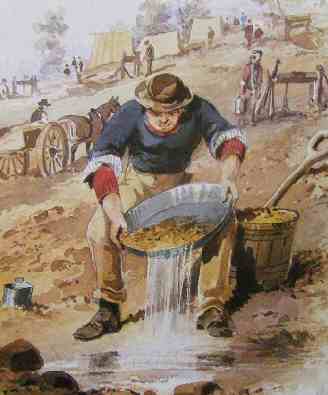Gold Rush of 1850s was a series of events that had some serious consequences for Austrailan society. We'll be talking about:
- migration and ethnic minorities
- representation and Eureka Stockade (also, we'll watch this CLIP in class)
- White Australia Policy
and
- the concept of "diggers"
Click on the picture below to read more about the era of Australian Gold Rush.
=============================
GROUP PROJECT
Now, here's my chance to check who is reading these posts before the class ;)
Next week your groups will be giving presentations on the topics below.
You can choose between:
1. General geography of Australia
2. General climate of Australia
3. Great Dividing Range
4. Great Barrier Reef
2. General climate of Australia
3. Great Dividing Range
4. Great Barrier Reef
FIRST COME, FIRST SERVED!
If you're one of the first people reading this post, you can grab the best/easiest topic for your group. Use the comments below this post to let me know what you have chosen - name of your group (e.g. Ladybirds) + the topic.
Some useful links:
https://www.3dgeography.co.uk/australian-geography
https://www.thoughtco.com/geography-of-australia-1434351
http://pandora.nla.gov.au/pan/21007/20100630-0906/www.culture.gov.au/articles/weather/index.html
http://pandora.nla.gov.au/pan/21007/20100630-0906/www.culture.gov.au/articles/greatbarrierreef/index.html
http://pandora.nla.gov.au/pan/21007/20100630-0906/www.culture.gov.au/articles/explorers/index.html
https://www.3dgeography.co.uk/australian-geography
https://www.thoughtco.com/geography-of-australia-1434351
http://pandora.nla.gov.au/pan/21007/20100630-0906/www.culture.gov.au/articles/weather/index.html
http://pandora.nla.gov.au/pan/21007/20100630-0906/www.culture.gov.au/articles/greatbarrierreef/index.html






